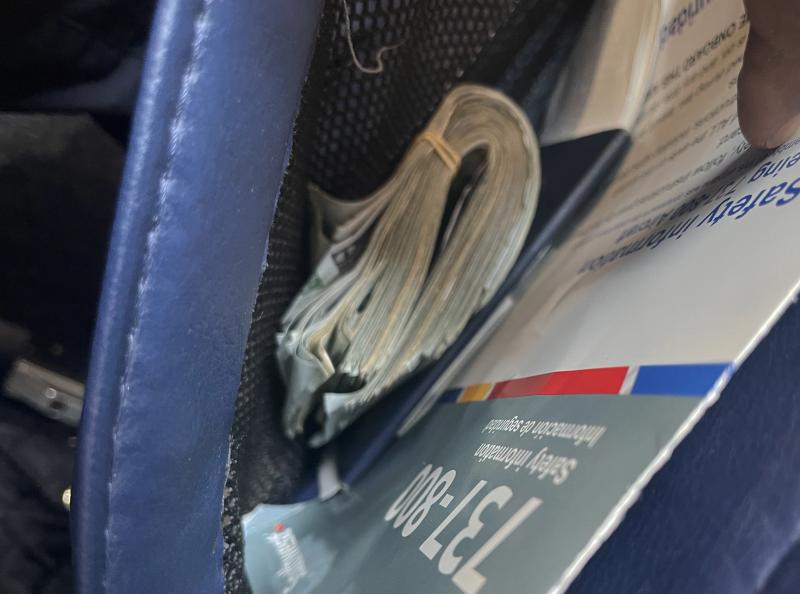Baltimore, Maryland - U.S. Customs and Border Protection (CBP) officers at Baltimore Washington International Thurgood Marshall Airport (BWI) continue to encounter travelers who refuse to comply with federal currency reporting laws after officers seized a combined $82,533 from four men, all heading to Montego Bay, Jamaica recently.
CBP wants to make clear that there is no limit to the amount of money that travelers may carry when crossing U.S. borders, and that the U.S. does not tax the currency that travelers carry.
The only two expectations that CBP -- and U.S. federal law [31 U.S.C. 5316] -- has of travelers is that they truthfully report all currency that they possess to a CBP officer, and that they complete a U.S. Treasury Department form (FINCEN 105) for all currency and other monetary instruments that exceed $10,000. Read more about currency reporting requirements.

airplane seat back.
In the most recent case on August 6, CBP officers seized a combined $59,587 from three men, ages 34, 33 and 25. The men individually reported to CBP officers that they had $7,500, $8,000, and $8,500; however, CBP officers discovered that the men $18,522, $21,560, and $19,505, respectively.
CBP officers interviewed the first man and learned that he was traveling with the other two who officers asked to deplane the aircraft. Interestingly, CBP officers found one man’s unreported currency concealed in the seatback of his assigned seat.
Additionally, on August 4, CBP officers seized $22,946 from a 75-year-old man who told officers that he possessed $12,000.
CBP is not releasing the names of either man because none were criminally charged. All four men are naturalized U.S. citizens or lawful permanent residents who were born in Jamaica.
“The disregard that some travelers have for our nation’s currency reporting laws is troubling and very unwise, especially when you consider that travelers can keep all their currency simply by just being honest and declaring the full amount to a Customs and Border Protection officer,” said Keith Fleming, Acting Director of Field Operations for CBP’s Baltimore Field Office.
CBP officers have observed that unreported currency can be proceeds from illicit activities, such as financial fraud and narcotics smuggling, and work hard to disrupt the export of these illicit revenues.
During inspections, CBP officers ensure that travelers fully understand federal currency reporting requirements and offer travelers multiple opportunities to accurately report all currency and monetary instruments they possess before examining a traveler’s carryon or checked baggage.
The consequences for violating U.S. currency reporting laws are severe; penalties may include seizure of most or all of the traveler’s currency, and potential criminal charges. An individual may petition for the return of seized currency, but the petitioner must prove that the source and intended use of the currency was legitimate.
